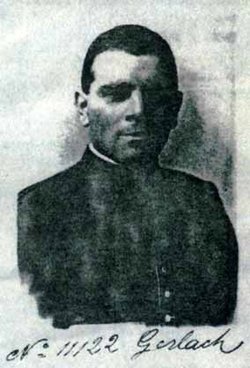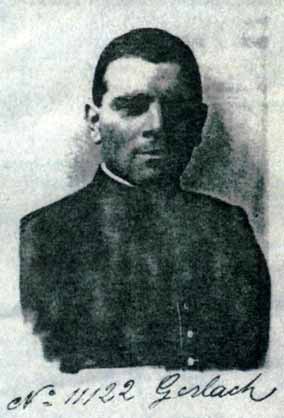Hailing from Bavaria, Gerlach served within the German military service and dedicated an intense action of espionage in favor of Germany. He was however caught and faced court martial and was sentenced him to death. Sources state that Gerlach was responsible to the sinking of the Italian ships Benedetto Brin, Regina Margherita and Leonardo da Vinci due to his espionage, causing the deaths 456 sailors aboard the Brin and other 248 victims of the Leonardo da Vinci.
Being close to Queen Mary Sophie, sister of the late Empress Sissy, he managed to escape execution after uncovering a number of Austrian spies working for Italy, and received help which set him free to Bavaria.
Arriving in Rome, he managed to pursue a career in the Apostolic Palace of the Vatican City, receiving the title of Cameriero Segreto Participantum of His Holiness, then Pope Benedict XV, directing the Stanze Papali whilst also serving the office of cerimoniere of the Pontifical House. The Italian Police however managed to identify him and issued a mandate of arrest. Loosing the personal confidence and protection of Pope Benedict, who while still a cardinal served as his professor, in order to avoid scandals, he was again helped to escape, as the State and the Holy See where already undergoing grave crisis. The young Monsignor was accused of spying within the Città Leonina and the Vatican itself, passing messages through the help of other spies to Bern, Switzerland and Evidenzbureau in Austro–Germany. He also secretly financed several journals and groups which advertised Italy's neutrality. Pope Benedict XV, known for deeply promoting peace across war conflicted countries, personally intervened for avoiding arrest to his beloved predilect student and arranged a 'fuga di stato', having him escorted to Switzerland on January 6, 1917.
The Italian Police managed to identify Gerlach by keeping under surveillance the Pontifical House, whose head was the Monsignor himself, assisted by a number of other figures, who later made name in the Italian headlines. On June 23, 1917, Gerlach was sentenced to life imprisonment for filtering military data as a spy.
According to secret dossier complied by Emanuele Brunatto (1892 – 1965), General Max Ronge, head of the Austrian Evidenzbureau, once stated the thanks to the interventions of Gerlach, his secret service managed to undercover all Italian war places, prior and during the conflict, including their successful operation in sinking the Benedetto Brin, while undergoing repairs in the port of Brindisi.
What ever happened to Gerlach remains a mystery. For sure he left his ecclesiastical career, returning to his former lay life. According to sources, it is said that he committed suicide in 1921, however another theory states that he died in Great Britain in 1946, where he retired living under an assumed name, leading on with his spying adventures. Pope Benedict XV had by then, died years earlier, on January 22, 1922.
Hailing from Bavaria, Gerlach served within the German military service and dedicated an intense action of espionage in favor of Germany. He was however caught and faced court martial and was sentenced him to death. Sources state that Gerlach was responsible to the sinking of the Italian ships Benedetto Brin, Regina Margherita and Leonardo da Vinci due to his espionage, causing the deaths 456 sailors aboard the Brin and other 248 victims of the Leonardo da Vinci.
Being close to Queen Mary Sophie, sister of the late Empress Sissy, he managed to escape execution after uncovering a number of Austrian spies working for Italy, and received help which set him free to Bavaria.
Arriving in Rome, he managed to pursue a career in the Apostolic Palace of the Vatican City, receiving the title of Cameriero Segreto Participantum of His Holiness, then Pope Benedict XV, directing the Stanze Papali whilst also serving the office of cerimoniere of the Pontifical House. The Italian Police however managed to identify him and issued a mandate of arrest. Loosing the personal confidence and protection of Pope Benedict, who while still a cardinal served as his professor, in order to avoid scandals, he was again helped to escape, as the State and the Holy See where already undergoing grave crisis. The young Monsignor was accused of spying within the Città Leonina and the Vatican itself, passing messages through the help of other spies to Bern, Switzerland and Evidenzbureau in Austro–Germany. He also secretly financed several journals and groups which advertised Italy's neutrality. Pope Benedict XV, known for deeply promoting peace across war conflicted countries, personally intervened for avoiding arrest to his beloved predilect student and arranged a 'fuga di stato', having him escorted to Switzerland on January 6, 1917.
The Italian Police managed to identify Gerlach by keeping under surveillance the Pontifical House, whose head was the Monsignor himself, assisted by a number of other figures, who later made name in the Italian headlines. On June 23, 1917, Gerlach was sentenced to life imprisonment for filtering military data as a spy.
According to secret dossier complied by Emanuele Brunatto (1892 – 1965), General Max Ronge, head of the Austrian Evidenzbureau, once stated the thanks to the interventions of Gerlach, his secret service managed to undercover all Italian war places, prior and during the conflict, including their successful operation in sinking the Benedetto Brin, while undergoing repairs in the port of Brindisi.
What ever happened to Gerlach remains a mystery. For sure he left his ecclesiastical career, returning to his former lay life. According to sources, it is said that he committed suicide in 1921, however another theory states that he died in Great Britain in 1946, where he retired living under an assumed name, leading on with his spying adventures. Pope Benedict XV had by then, died years earlier, on January 22, 1922.
Sponsored by Ancestry
Advertisement
Explore more
Sponsored by Ancestry
Advertisement


